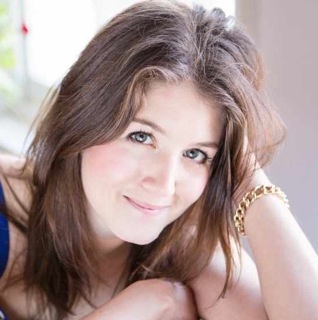Walton’s Façade is not performed very often in London, but this weekend there is the opportunity to hear it four days in a row: on Monday at a chamber Prom, but before that in this enterprising staging, paired with Peter Maxwell Davies’ Eight Songs for a Mad King.
The original conception of Façade was that it should be performed “in as abstract a manner as possible” but this interpretation is as specific as possible. 84 days after the end of the First World War, the patients at an asylum for those mentally scarred by the conflict gather to perform music together. The reciter’s part is shared between two actors – the hardworking Charmian Bedford (pictured below) and Danny Standing – who enact a series of miniature dramas reflecting Edith Sitwell’s intricate and fantastical verse, at times consoling each other, or flirting, teasing or confronting each other, using a range of resonant props including poppies and a gun.
 The music came through loud and clear – in the case of the percussion, very loud. The band of six, excellently led by the understated but authoritative Oliver Zeffman, played with the necessary wit and zing. Unfortunately, the balance between voices and instruments was calamitous; there was clearly a microphone malfunction, which made it worse, but things weren’t right even before that. So, sadly, for all the rich direction by Ella Marchment and enjoyable choreography of Joseph Toonga, the real glory of Façade – the brilliant words – was often completely lost.
The music came through loud and clear – in the case of the percussion, very loud. The band of six, excellently led by the understated but authoritative Oliver Zeffman, played with the necessary wit and zing. Unfortunately, the balance between voices and instruments was calamitous; there was clearly a microphone malfunction, which made it worse, but things weren’t right even before that. So, sadly, for all the rich direction by Ella Marchment and enjoyable choreography of Joseph Toonga, the real glory of Façade – the brilliant words – was often completely lost.
Façade is connected, musically speaking, with Eight Songs for a Mad King by a quality of knowingness, the using of other people’s music unabashedly in the cause of creating something new. But where Walton’s music is sophisticated and polished, Maxwell Davies creates a sound-world which is brutal and unforgiving, shining a harsh light on the mental agonies of King George III. The King, encircled by the players, interacts with each in turn, in an attempt to come to terms with the prison of his condition. Eventually, in fury, he grabs the violinist’s instrument and, in a brilliantly shocking coup de théâtre, smashes it to pieces.
 Eight Songs for a Mad King is a virtuosic showpiece, and its success rests almost entirely on performance of the King, sung here by Samual Pantcheff (pictured right). There was an engaging vulnerability to his interpretation of a sick person who knows something is not right with him, but can’t put his finger on what is amiss. The vocal pyrotechnics were well handled; it is an unforgiving piece, with little “straight” singing apart from the Handel quotations near the end, and extended techniques are used throughout. Pantcheff’s reading perhaps did not always plumb the depths of the King’s despair, but in his violin-smashing fury there was a genuine thrill.
Eight Songs for a Mad King is a virtuosic showpiece, and its success rests almost entirely on performance of the King, sung here by Samual Pantcheff (pictured right). There was an engaging vulnerability to his interpretation of a sick person who knows something is not right with him, but can’t put his finger on what is amiss. The vocal pyrotechnics were well handled; it is an unforgiving piece, with little “straight” singing apart from the Handel quotations near the end, and extended techniques are used throughout. Pantcheff’s reading perhaps did not always plumb the depths of the King’s despair, but in his violin-smashing fury there was a genuine thrill.
The balance issues of the first half were much less of a problem, largely because Maxwell Davies’s scoring is much sparer, and allows the voice to come through; it was also a help that the role is sung rather than spoken.
Staging Façade, although it was not in Walton’s plans, is a perfectly reasonable thing to want to do, and the World War I setting, although a bit contrived in some particulars, largely worked. The pairing with Eight Songs was an interesting idea, and some nice directorial and design touches connected the two pieces. This was my first experience of the Grimeborn festival of new and unusual operas at Arcola, but I will make a point of returning next year.
- Follow @bernardlhughes on Twitter
- Two remainining Arcola performances in the Grimborn Festival of Opera















Add comment